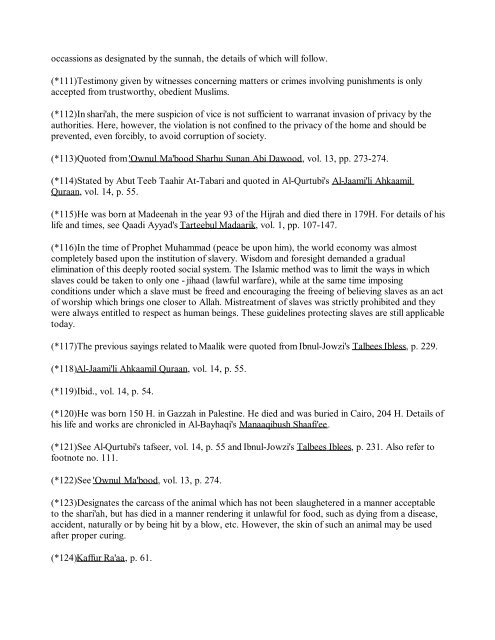The Islamic Ruling on Music and Singing - Enjoy Islam
The Islamic Ruling on Music and Singing - Enjoy Islam
The Islamic Ruling on Music and Singing - Enjoy Islam
You also want an ePaper? Increase the reach of your titles
YUMPU automatically turns print PDFs into web optimized ePapers that Google loves.
occassi<strong>on</strong>s as designated by the sunnah, the details of which will follow.<br />
(*111)Testim<strong>on</strong>y given by witnesses c<strong>on</strong>cerning matters or crimes involving punishments is <strong>on</strong>ly<br />
accepted from trustworthy, obedient Muslims.<br />
(*112)In shari'ah, the mere suspici<strong>on</strong> of vice is not sufficient to warranat invasi<strong>on</strong> of privacy by the<br />
authorities. Here, however, the violati<strong>on</strong> is not c<strong>on</strong>fined to the privacy of the home <strong>and</strong> should be<br />
prevented, even forcibly, to avoid corrupti<strong>on</strong> of society.<br />
(*113)Quoted from 'Ownul Ma'bood Sharhu Sunan Abi Dawood, vol. 13, pp. 273-274.<br />
(*114)Stated by Abut Teeb Taahir At-Tabari <strong>and</strong> quoted in Al-Qurtubi's Al-Jaami'li Ahkaamil<br />
Quraan, vol. 14, p. 55.<br />
(*115)He was born at Madeenah in the year 93 of the Hijrah <strong>and</strong> died there in 179H. For details of his<br />
life <strong>and</strong> times, see Qaadi Ayyad's Tarteebul Madaarik, vol. 1, pp. 107-147.<br />
(*116)In the time of Prophet Muhammad (peace be up<strong>on</strong> him), the world ec<strong>on</strong>omy was almost<br />
completely based up<strong>on</strong> the instituti<strong>on</strong> of slavery. Wisdom <strong>and</strong> foresight dem<strong>and</strong>ed a gradual<br />
eliminati<strong>on</strong> of this deeply rooted social system. <str<strong>on</strong>g>The</str<strong>on</strong>g> <str<strong>on</strong>g><strong>Islam</strong>ic</str<strong>on</strong>g> method was to limit the ways in which<br />
slaves could be taken to <strong>on</strong>ly <strong>on</strong>e - jihaad (lawful warfare), while at the same time imposing<br />
c<strong>on</strong>diti<strong>on</strong>s under which a slave must be freed <strong>and</strong> encouraging the freeing of believing slaves as an act<br />
of worship which brings <strong>on</strong>e closer to Allah. Mistreatment of slaves was strictly prohibited <strong>and</strong> they<br />
were always entitled to respect as human beings. <str<strong>on</strong>g>The</str<strong>on</strong>g>se guidelines protecting slaves are still applicable<br />
today.<br />
(*117)<str<strong>on</strong>g>The</str<strong>on</strong>g> previous sayings related to Maalik were quoted from Ibnul-Jowzi's Talbees Ibless, p. 229.<br />
(*118)Al-Jaami'li Ahkaamil Quraan, vol. 14, p. 55.<br />
(*119)Ibid., vol. 14, p. 54.<br />
(*120)He was born 150 H. in Gazzah in Palestine. He died <strong>and</strong> was buried in Cairo, 204 H. Details of<br />
his life <strong>and</strong> works are chr<strong>on</strong>icled in Al-Bayhaqi's Manaaqibush Shaafi'ee.<br />
(*121)See Al-Qurtubi's tafseer, vol. 14, p. 55 <strong>and</strong> Ibnul-Jowzi's Talbees Iblees, p. 231. Also refer to<br />
footnote no. 111.<br />
(*122)See 'Ownul Ma'bood, vol. 13, p. 274.<br />
(*123)Designates the carcass of the animal which has not been slaughetered in a manner acceptable<br />
to the shari'ah, but has died in a manner rendering it unlawful for food, such as dying from a disease,<br />
accident, naturally or by being hit by a blow, etc. However, the skin of such an animal may be used<br />
after proper curing.<br />
(*124)Kaffur Ra'aa, p. 61.

















